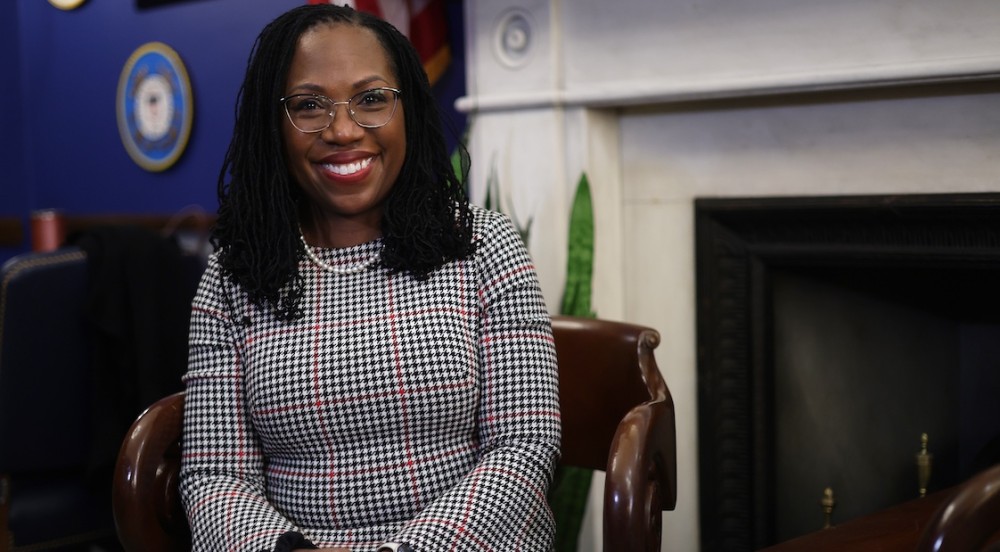Breaking barriers is painful, and being first means being best, a thousand times over. We understand that truth because we've lived it, but most of us could not have imagined it would mean the vicious attack that Justice Ketanji Brown Jackson endured in the runup to her historic confirmation.
But endure she did. Her composure and poise stood in stark contrast to the infantile antics of Senators Ted Cruz, Jeff Hawley, Tom Cotton, Lindsey Graham and Marsha Blackburn, who pitched a collective tantrum the likes of which we haven't seen on the Senate floor—unless you count the behavior of Brett Kavanaugh throughout his own nomination hearings.
Judge Jackson suffered through two horrific days as our elected officials turned Constitutional privilege on its head. They tried to paint an accomplished jurist and former public defender as a pedophile apologist for following the sentencing guidelines in a criminal case. They tried to paint her as un-American for duly representing the accused held at Guantanamo Bay.
Justice Jackson is a Harvard-trained lawyer who edited the university's law journal and graduated with honors. She had a world of opportunities in front of her, and chose to dedicate her talent to public interest law. Yet her detractors tried to paint her, absurdly, as somehow advocating for crime for work long considered an admirable calling.
One of the most qualified candidates for the U.S. Supreme Court in recent history was proclaimed by some inconsolable crybabies in the U.S. Senate as unacceptable.
She would never have been acceptable to them, and that is a reality she had to come to terms with when she first stepped foot on the Harvard College campus as an undergraduate. During the hearings she shared her story of being reassured by the first Black woman she saw on campus. The other side of that is it was very clear to her that some of her classmates would never accept her. I know firsthand what that is like. For some, there are spaces and places where a Black woman just doesn’t belong. As a fellow Harvard law alum, I remember my first days on the law school campus in the same way that she described feeling her first day on the yard as an undergraduate. I remember feeling undeserving and unworthy of being there.
We hear that same sentiment from accomplished Black women from Harvard Law and other schools across the nation. But today, as I hold an invitation in hand to the White House reception celebrating our first Black woman Supreme Court Justice, I am more convinced than ever that Black women have a superpower. It is our ability to dream with ambition, remain steadfast in the face of uncertainty, and never stop believing that we can make the impossible, possible.
Black women lawyers have a brilliant legacy of breaking barriers. I think of Constance Baker Motley, who did not have cameras recording her detractors when she became the first Black woman to argue before the Supreme Court and the first to serve as a federal judge. We do not have video evidence of what she surely endured to get there, but we know for certain that she rose above it.
That persistence and the unflappability demonstrated by Judge Jackson hour after hour throughout the hearings are qualities of utmost importance on the bench. A few years ago, I served on a committee of lawyers for then-Senator Kamala Harris reviewing candidates the Trump administration put forth for judicial appointments in the state of California. We were charged with assessing a nominee's qualifications, and that meant looking at temperament, searching for reflective, thoughtful, deliberative professionals.
Those attributes have never been more forcefully on display than in Judge Jackson's hearings, and that is the real story of the day. In a time of unprecedented partisanship, Judge Jackson came out of those hearings with the support of 75 percent of Americans and a bipartisan vote confirming her nomination.
The attacks didn't prevent her ascendency, they fortified it, and that is what has these folks so terrified.
Change is slow. This particular breaking of barriers was long overdue—but it still stands as progress. For those who want to maintain the status quo, who want to ignore history if not ban it outright from even being taught, the undoing of this 200-year-old boys club is a harbinger of what's to come.
They'll fight it, but we will remain steadfast believers in our own brilliance, and we will endure.
Areva Martin is a civil rights attorney, CNN legal analyst and host of the web series "The Special Report and Areva Martin Out Loud" on KBLA Talk Radio.













